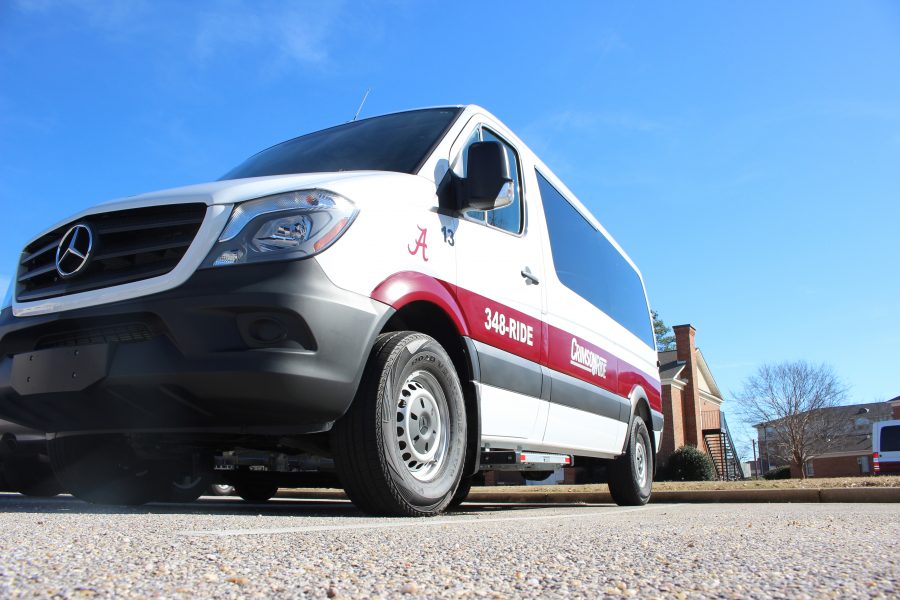Students rely on 348-RIDE to get them home safely from late night library runs, nights out with friends or fraternity row. From the 2013-14 school year to the 2014-15 school year, the rider total increased by 1,160 users, said Chris Bryant, Interim Director of Media Relations. As the number of passengers of 348-RIDE increases, more complaints continue to increase by students about the services, slowness and rude behaviors by the employees of the program.
“I called them two times once for a ride; they hung up on me and never came,” said Sarah Dan, a sophomore majoring in business management.
Students reported that operators often hang up the call while the person is mid-sentence and they have told students who are asking for directions to call back later or look online.
“They are super rude when you call,” said Amanda Sinclair, a sophomore majoring in criminal justice. “It’s like they don’t want to be there at all.”
Issues with 348-RIDE’s service don’t stop with the operator. Students have encountered situations with drivers that are unfriendly and uncomfortable.
“One time, I was just trying to get a ride home safely and a driver said he wasn’t going to my apartment complex and when I asked why not, he just told me that if I didn’t get out of his van he would call 911 on me,” Sinclair said.
Currently program does have a system through which students can file complaints about its service.
“Each shift has a team leader assigned that oversees the dispatchers and van operators,” said James Knickrehm, assistant director of transportation services. “The team leader handles customer service challenges during their shift. They relay reported events to the assistant director of transportation services.”
The flexibility of a “walk-up” student getting a ride only depends on how many passengers are scheduled to ride in a certain van. Since 348-RIDE vans have 11 seats, a driver’s main job is to get those who requested a ride either by phone or app home first. Students like Sinclair wonder if robberies and assaults on and around campus could be prevented if 348-RIDE’s service was better executed.
“We literally get an email at least once a week from UAPD explaining another incident and I think if 348 was better this problem would be solved,” Sinclair said.
This concern was met by no response or comment from either Knickrehm or 348-RIDE.
Issues with 348-RIDE have become a normal occurrence for students here at the University. Heather Woods, a sophomore majoring in elementary education, said the worst issue is seeing vans parked at the transit hub with no one driving them.
“I’ve waited almost 45 minutes for a 348 [-RIDE] one time, and it usually is about a 20 minute wait,” she said. “If they had more people to drive all of those unused 348’s, there would be much less waiting time and it would be safer for the people who order them. It’s dangerous, especially if a person is alone, to be waiting for a ride for almost 30 minutes in the dead of night.”
Knickerehm said the University is looking to improve student transportation.
“348-RIDE always looks for ways to improve service given current operational parameters,” Knickrehm said. “Numerous factors influence van operation – mileage, service rotation, maintenance, back – up capability / spare ratio, 348-EXPRESS support, and, finally, staff availability.”
As part of the RideCell program, a closed, cloud-based system that allows dispatchers or team leaders to assign students to a van established by the University, the system alerts the driver of a pickup and drop-off location requested.
“As the driver approaches the pick-up location, the driver through RideCell notifies the student they are approaching,” Knickrehm said. “Upon arrival, the van operator starts a timer on their RideCell tablet. If the student boards, the operator taps the tablet, and it logs the student as a rider. If the student does not show after the time expires, they are annotated as a no show. The operator completes the process when they drop the student off at their requested location, and the information is captured again in RideCell.”
Nowhere in the explanation behind the operating system does it state the driver registers exact location. This means, unless there are other unknown methods involved, the University has no way of tracking if drivers are stopping at the pickup location.
“I stood on the curb waiting for it,” said Allison Shrake, a sophomore majoring in nursing. “The driver drove up to the curb and didn’t stop and sped away. I called and complained about [it] and the lady was super rude, saying my driver left because I hadn’t been there.”
Kerry Beach, a sophomore majoring in English, shared a similar experience.
“I ordered a 348 [-RIDE] at 3 a.m. during homecoming week [last year] after we finished pomping,” said Beach. “I was waiting on the porch of Theta when I saw a 348 [-RIDE] speed by me, with no means to stop. I was clearly there waiting but thirty seconds later I got the “no show” text.”
Recurring issues of drivers not showing up, speeding away, hostile operators and rude service has become what many come to associate with 348-RIDE. A service created to provide a way for students to get home safe at late hours of the night has turned into an issue rather than a solution for some.
While there are those who have experienced great services from the program and its staff, some are still left wondering when the University will fix the issues many are having and have some suggestions for how the program could be better run.
“Honestly, they need to put operators through a customer service course. A solid 90 percent of the time I’ve used them, the operators were the issue,” said Kelci Avery, a junior majoring in economics.
“Transportation Services takes any concern or suggestion expressed by individuals seriously, and they are investigated,” Knickrehm said. “Corrective measures are put into place to address the concerns when needed. And if a suggestion to improve service is plausible, they are put into place.”
Students who would like to express a concern or suggestion should contact James Knickrehm, assistant director of transportation services, at [email protected] or (205) 348-0131.







